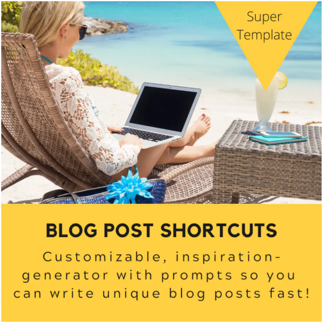This is a guest post from Karon Thackston of MarketingWords.com.
All too often, we think of the blog that we write for as “our” blog. And, it is. We, as the website owner, have control of the blog. We created it, we operate it, we publish posts on the blog. It is, in fact, ours.
In reality, however, “our” blog shouldn’t be entirely about us. It’s more like a partnership where we have controlling interest, but our readers have an almost-equal say. After all, if they don’t want to read the posts we add to our blogs, we’ll quickly find ourselves in a deserted area of the Internet filled with virtual tumbleweeds.
The trick? Write blog posts with your readers in mind. Yes, you absolutely need to incorporate your unique personality and charm into each post you write. But including your target audience (readers) in every step goes a long way to creating the best posts possible and ensuring continued engagement.
1. Create & Read Your Audience Persona
Do you have a target audience persona (profile)? You really should! This is essentially an outline / synopsis of those who regularly read the posts on your blog. It includes information such as:
- Age
- Income level
- Education level
- Gender
- Interests
- Hobbies
- Profession
- Stage of life
- Biggest concerns (related to the topic(s) you blog about)
- And much more.
How do these seemingly boring details impact your writing. Think about it like this.
Let’s say you operate a pet blog. You regularly write posts about dog-related topics, which is awesome! And you get some likes, shares, and comments. However, after you do a bit of research and ask some questions, you realize (much to your surprise) that 46% of your readers have only cats or have dogs and cats as companions. What’s more, 25% have ferrets in addition to a cat or dog!
Also, 58% of people have income under $35,000 per year and state that their biggest pet-related concerns are linked to the expenses of owning their pets.
Now what do you do? You begin cranking out posts about not only dogs, but also cats and ferrets. Your topics might shift from always writing about dog exercise, eating habits, and travel to also including tips for affordable health care for all of these (and other) pets.
A profile/persona can be as detailed or simplistic as you want. Obviously, the more useful information you include, the better you’ll understand your target audience.
Start by asking some basic questions like the ones listed above to get foundational knowledge of who you are writing to. Then add to the persona regularly as you discover new tidbits of info.
2. Choose the Right Blog Post Style
While editorial (opinion) blog posts are without a doubt the most used, there are lots of other styles in which you can write to switch things up and keep your visitors interested. Try one of these:
- Interview — Just like Oprah, you can bring others to your audience to share their knowledge with your peeps. Email interviews are a breeze to conduct; much less trouble than audio or video interviews (which are also great, but require much more work). Send someone 5 to 10 questions via email and ask them to answer them. Format that into a blog post and you’re done!
- Investigation — Dig deep into a current event, new government policy, or even a product recall that might affect your readers. They’ll be glad you took the time to uncover and explain the details.
- Demo — Have you heard about new software, a special process, or a clever hack that your audience would love? Outline a quick demo complete with highlights of the biggest pros and cons. And, of course, lots of pics!
Depending on the topic you’re covering, one of these might work much better than the standard editorial.
3. Create a Title That Makes Them Say, “Oooh!”
A lot of weight hangs on the shoulders of your blog post title. This is the most important element, without a doubt. More so than the content? Yes! That’s because, if no one is impressed with your title, the chances are minuscule that they will read the rest.
As a serious blogger, you should have an arsenal of title templates at the ready, so you can elicit the reaction “Oooh … I want to read THAT!” from your visitors.
Here are 10 to add to your list.
- How I Earned [$x.xx] for Only [Doing This]
- How I Increased [This Statistic] in [Amount of Time] With Only [This]
- Why [This] Matters for [Selling More, Getting More Leads, Etc.] and How to Improve Yours
- [#] Things to Remember When [Writing, Selling, Training] a Perfect [Book, Product, Service, Etc.]
- Introducing a [Simpler, Easier, Better, Etc.] [Product, Service, Etc.] Just for [Whoever]
- [#] Types of [Whatever] That are Proven to Work
- [This Thing] vs. [This Other Thing]: Differences You Should Be Aware Of
- [#] Steps for [Doing This] Right Every Time
- [#] Traits of a Successful [Whatever]
- Our/My [#] Favorite [Whatever] and Why I/We Love Them
4. Captivate Your Readers With An Engaging Opening Paragraph
Once you’ve mastered the title hurdle and enticed your audience to read on, you’ll need to hook them with your opening paragraph. Nothing conjures up a yawn quicker than phrases such as “You are probably already aware…” or “Today I want to tell you about….”
Instead of using these mediocre introductions to your post, try something a little more jolting, like:
- Leaving out nouns. “It” was the one thing I feared most and there it was dangling right in front of me. What is? What was scary? Readers have to continue on to find out.
- Replacing typical words with super verbs and adjectives. Which ones bring up a more powerful mental image? Break or smash? Promise or swear? Hate or detest? Choose words that help your audience envision precisely what you mean.
- Ask a question. When someone asks a question, our brains instantly and automatically engage in order to scour our minds for the answer. Asking questions is a good thing for hooking your audience!
- Shock your reader. Drinking just two sugary sodas per day increases your chances of cancer by 92%. Or, give it a one-two punch by turning that shocking factoid into a question: Did you know that drinking just two….
Once you devote a bit of gray matter to your target audience, you’ll find it’s easier to create exceptional blog posts that garner praise and compliments! The problem can sometimes be that we don’t have the proper inspiration to expand our skills when it comes to blog writing.
 Need a little dose of inspiration for your own blog? Check out Karon’s Blog Post Shortcuts. Each shortcut pack is…
Need a little dose of inspiration for your own blog? Check out Karon’s Blog Post Shortcuts. Each shortcut pack is…
- 100% customizable for practically any niche.
- Reusable an unlimited number of times for an unlimited number of posts.
- Way better than an ordinary blog post template that have mostly blank lines.
- Not Private Label Rights (PLR) content that is completely pre-written for you. Your posts will be in your voice.
- Seriously cheaper than hiring a ghostwriter, plus you get to show off your own unique writing talent with a hefty dash of added inspiration!
Stock up on Blog Post Shortcuts and never run out of blogging ideas again.



Hi! Cindy,
Very interesting and informative post. Numbers 3 and 4 will be very helpful, I’m always having trouble deciding on a blog post title and opening paragraph.
Your right about hooking your reader right away, if the title and first few lines are not super interesting, they will never read the rest.,
Bob K.
Thanks Bob! You definitely have to hook them from the start, and even then, I think most people skim. Bullet points, subheadings and images help keep people engaged, too.